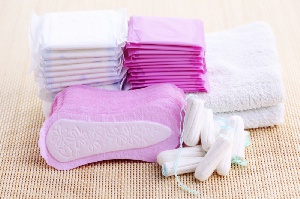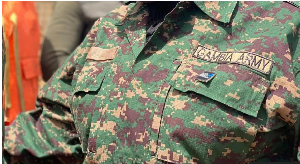When I was twelve years old, I remember feeling confused and embarrassed when I started menstruating. It wasn't something my friends or I talked about, and I didn't know how to manage it properly. But as I grew older, I learned that this experience was not unique to me. Millions of girls and women around the world face similar challenges when it comes to menstrual hygiene management, and Ghana is no exception.
According to a report by United Nations Children’s Funds (UNICEF), 95 per cent of girls living in rural communities in Ghana miss 20 per cent of school because they did not have access to sanitary pads. We are in the 21st century and these figures are not encouraging
Since the inception of Menstrual Hygiene Day in 2014 internationally, Ghana has made significant efforts to address period poverty and improve menstrual hygiene management. However, despite these efforts, challenges and gaps still persist. That's why it's important that we come together to examine our progress and confront the hard truth about period poverty in Ghana.
In this analysis, we'll take a closer look at the achievements made thus far, including specific figures and data. But this is just the beginning. It's up to all of us - government, NGOs, communities, and individuals - to continue the fight against period poverty. Together, let's ensure that every girl and woman in Ghana has access to the resources they need to manage their menstrual hygiene with dignity and ease.
Achievements in Ghana
Menstrual Health Education: Various organizations, including the government and NGOs, have implemented educational programs to raise awareness about menstrual health and hygiene. These initiatives aim to provide accurate information and dispel myths and stigmas associated with menstruation.
Sanitary Pad Distribution: Efforts have been made to distribute free sanitary pads to schoolgirls in some regions of Ghana. For instance, the government's Free Senior High School program includes the provision of free sanitary pads to help ensure girls' uninterrupted attendance in school.
Increased Interest: Over the recent past, several NGOs and community based organizations have taken keen interest in initiatives to that drive access to sanitary pads and menstrual hygiene education especially in rural areas. I have taken keen interest in organizations such as Guides and Girls Scout Association, WASH United, SCABA Foundation and rugirlzems
Challenges and Missing Aspects in Ghana
Policy Challenges: The prices of menstrual hygiene products are high considering the average income of households in Ghana. The government has imposed 12.5% VAT (value Added Tax) on sanitary pads and a 20% Import tax on all imported sanitary pads. Civil Society groups have appealed to the government to remove these taxes with the aim of enhancing menstrual hygiene and quality of life.
Limited Access to Menstrual Products: Despite efforts to distribute free sanitary pads, many girls and women in Ghana still face challenges in accessing affordable menstrual products. According to a 2018 study by Plan International Ghana, approximately 30% of girls reported difficulties in accessing menstrual products.
Lack of Adequate Sanitation Facilities: Inadequate sanitation facilities in schools and public spaces pose challenges to menstrual hygiene management. According to UNICEF, in 2019, only 14% of schools in Ghana had separate functional toilets for girls, contributing to unhygienic practices and limited privacy during menstruation.
Socio-Cultural Stigma: Stigma and taboos surrounding menstruation persist in Ghanaian society. Girls and women often face discrimination, shame, and embarrassment due to menstrual beliefs and cultural norms, hindering open discussions and comprehensive menstrual health education. Some culture frown on sustainable and cheaper options to mainstream solutions. Example, some women in certain communities we visited will not use menstrual caps for fear of losing their virginity.
Menstruation and Education: Period poverty affects girls' education in Ghana. Limited access to menstrual products, coupled with a lack of proper sanitation facilities, contributes to absenteeism and reduced school performance. A study by UNICEF reported that about 95,000 Ghanaian girls miss school during menstruation.
Sustainable Menstrual Products: While reusable menstrual products like menstrual cups and cloth pads are gaining attention globally, their availability and affordability remain limited in Ghana. The majority of girls and women rely on disposable sanitary pads, which can be costly and unsustainable in the long term.
Addressing these challenges requires focused interventions
Affordable and Accessible Menstrual Products through innovation: Efforts should be made to improve access to affordable menstrual products, including exploring local production and distribution channels. Startups should explore Partnerships with NGOs and Government to develop sustainable and cheaper solutions that can help increase availability and reduce the cost of sanitary pads.
Improved Sanitation Infrastructure: Investment in the construction and maintenance of separate and functional toilets for girls in schools is crucial. Additionally, providing water and handwashing facilities can support proper menstrual hygiene management.
Menstrual Health Education: Comprehensive menstrual health education should be integrated into school curricula, ensuring accurate information and addressing stigmas. This education should also target parents, teachers, and community members to foster a supportive environment for menstrual health.
Advocacy and Stakeholder Engagement: Continued advocacy efforts are necessary to raise awareness about period poverty and the importance of menstrual hygiene management. Engaging stakeholders, including government agencies, NGOs, and community leaders, can help drive sustainable change.
In conclusion, Ghana has made significant strides in addressing period poverty through educational programs, sanitary pad distribution, and increased interest from NGOs and community-based organizations. However, challenges such as high prices of menstrual hygiene products, limited access to menstrual products, lack of adequate sanitation facilities, socio-cultural stigma, and reduced school performance for girls still persist.
Addressing these challenges requires focused interventions, including improving access to affordable menstrual products, investing in sanitation infrastructure, comprehensive menstrual health education, and continued advocacy efforts. As we look towards a future without period poverty in Ghana, it's up to all of us - government, NGOs, communities, and individuals - to continue working together to ensure that every girl and woman has access to the resources they need to manage their menstrual hygiene with dignity and ease. Join the fight against period poverty today and contribute to a future where no girl or woman is left behind.
Opinions of Monday, 22 May 2023
Columnist: Esther Makafui















